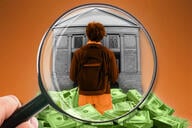You have /5 articles left.
Sign up for a free account or log in.
The University of Mississippi’s third major incident involving violations by football boosters has led the National Collegiate Athletic Association to take the unusual step of barring the Rebels program from postseason play in 2018 -- a penalty the university said it would “vigorously appeal.”
The verdict comes after the NCAA’s Division I Committee on Infractions found that six football staffers and a dozen boosters had helped funnel $37,000 in cash payments to recruits and provide access to free lodging, cars, meals and apparel. The university lacked institutional control over its football program, the committee concluded, a finding the NCAA has used with decreasing frequency in recent years.
In addition to the 2018 bowl ban, the Rebels face scholarship reductions and several of its former or current coaches or administrators were given show-cause orders, meaning they are likely to be limited from athletics-related positions for a certain number of years.
Mississippi must also pay $5,000 in addition to the roughly $180,000 fine it chose to pay and vacate games in which ineligible players were involved.
Former head coach Hugh Freeze, who resigned in July amid revelations that he had called an escort service from his work phone, will be suspended for two games in the 2018 season should any other NCAA institution hire him.
But the 2018 bowl ban remains the harshest punishment, in part because NCAA rules stipulate senior players can now transfer without penalty, potentially weakening Mississippi’s position in the Southeastern Conference.
Chancellor Jeffrey S. Vitter released a statement saying the university intended to fight the 2018 ban. It had already taken itself out of postseason play for the 2017 season.
“The additional postseason ban is excessive and does not take into account the corrective actions that we have made in personnel, structure, policies and processes to address the issues,” Vitter said in a statement.
The university faced “strikingly similar” cases in both 1986 and 1994, said Greg Christopher, the NCAA’s chief hearing officer and athletics director at Xavier University, in a call with reporters Friday.
“This is now the third case over three decades that has involved the boosters and football program,” the NCAA Division I Committee on Infractions wrote in its decision. “Even the head coach acknowledged that upon coming to Mississippi, he was surprised by the ‘craziness’ of boosters trying to insert themselves into his program.”
While some expected much stronger sanctions against Freeze, Christopher said Friday that the coach had promoted an “atmosphere of compliance” but simply failed to exercise oversight over his staff. Freeze also cooperated throughout the investigation, Christopher said.
In what could be described as an old-school athletics caper, an assistant athletics director arranged for cash payouts facilitated by boosters to some prospects, between $13,000 and $15,600, and then lied about it in an interview with NCAA investigators, the Committee on Infractions said.
Two staffers forged ACT scores for the recruits and organized for a booster to provide five recruits with housing and transportation while they completed academic work to be eligible.
One particularly interesting aspect of the case was the involvement of one Mississippi State University football star, Leo Lewis, who had been wooed by multiple SEC programs, including Ole Miss.
SBNation reported in depth on the deal the NCAA struck with Lewis: it would offer him limited immunity from punishments if he would share details of the cash and perks institutions had showered him with.
Lewis’s statements to the NCAA helped bury the University of Mississippi but also placed him as a co-defendant in a civil lawsuit that could cost him big money if he is found liable, SBNation reported. The plaintiff is the suit is Rebel Rag, an apparel shop that is alleging defamation against Lewis.
In a highly unusual move, Lewis was brought in to testify to the Committee on Infractions.
Christopher said that the NCAA had offered this partial immunity to six individuals in the course of the investigation. He also criticized the leaks to press, saying they degraded the integrity of the investigation.
“We don’t stress confidentiality to be secretive or to not be transparent about our process,” he said.




